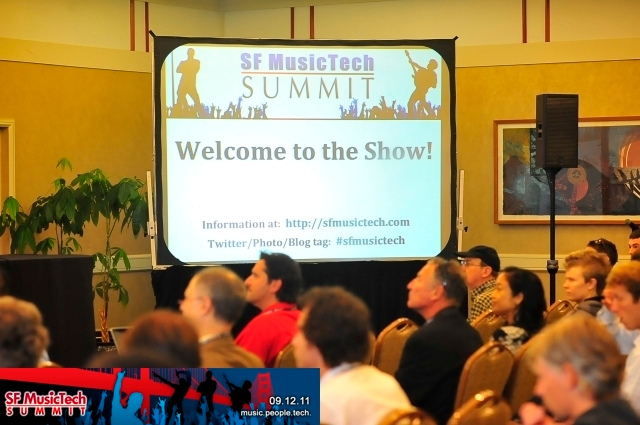 Photo Credit: Jesse Lara
Photo Credit: Jesse Lara
by Nishat Kurwa
SAN FRANCISCO-What does it mean to make a living as a musician in the digital age, and what are the most viable revenue streams to help achieve that dream?
Those were two of the dominant questions at the SF MusicTech Summit this week, where representatives from internet radio platforms, music app startups, and the recording industry gathered to discuss, as they did inFebruaryat the same conference, the implications of music's unbridled digital transmission between consumers, as well the expanding opportunities to charge people for that content.
As the Summit kicked off and Pandora's breakdown of its payments to artists ricocheted around the Internet, Pandora founder Tim Westergren held court at a panel here to sound an alarm over increasing royalty costs for the streaming radio platform. During what Lauren Danzy, Marketing Manager for performance rights group SoundExchange, called a "lively discussion," Westergren stumped for the Internet Fairness Act, of which Pandora has been a leading proponent. Westergren maintains that the current rates that Pandora pays are making its business unprofitable, and he suggested that the costs have a trickle-down effect: stifling the company's capacity to create new revenue opportunities for musicians.
Danzy said part of what drew her to attend SF MusicTech for the first time was her interest in galvanizing artists to get involved in the fight for increased payments. "This conference is just great. It's got a lot of people in the tech space, I mean, serious movers and shakers. Everybody from entrepreneurs with startup businesses to more established organizations, and a lot of music advocates, which I love. I love to be here with people who are really fighting on behalf of artists," she enthused.
Artists themselves seemed to be outnumbered by "suits," both from large internet companies and from music technology startups (many of the latter hastened to remind audiences that they were once, or are still, musicians themselves). There were a few working musicians on panels here, included Berkeley's Lyrics Born and cellist/composer Zoe Keating, who walked a fine line between expressing resoluteness and weariness that it seems incumbent upon artists to be enterprising beyond the creation of their art itself, and continually boostrap their way to new revenue sources. "I never had any expectation of a roadmap," Keating said of her approach to artistic sustainability. "If the doors are closed, make your own building. If suddenly streaming closes a door, I'll just make another building to make money in." Keating, who had just posted her 2011 income online the night before the Summit, acknowledged the risk in such transparency, saying, "For a lot of artists, there's a tradition that if they start talking about finances, people say, 'Shut up and make music.'" She cited the band Grizzly Bear, which told fans, essentially, "If you want to help us, the best thing you can do is buy an album," and when a debate ensued, Keating said, "there was silence on their end."
Inevitably, there were many references to artist strategies for funding projects on Kickstarter, but they came with cautionary notes and mentions of Amanda Palmer, who faced backlash after raising more than a million dollars on the crowdfunding platform and then asking people to volunteer for her tour.
But another view of Kickstarter's benefits for artists came from Theda Sandiford, VP of Digital Marketing for Universal Republic Records. On a panel called "Predictions, Proclamations, and Educated Guesses," she described what happened when a Universal band called The Last Bison wanted to make a video during their recording period, when they couldn't yet dip into the marketing budget. "They went on Kickstarter, raised $5,000, and made an amazing video. They got their friends to help out, funded it, pulled it off, and with no marketing help (from Universal) got 80,000 streams on the record." The story duly impressed her higher-ups, Sandiford said. "I love it when bands take initiative. I'm constantly encouraging them. Every time they find some success, I share that story, and try to turn that 'Not right now' into a yes."
Sandiford also said that increasingly, artists are negotiating directly with internet companies to stream their content, but that without the leverage that record companies have, those artists are at a disadvantage. "Working with a big company that has the leverage, we are able to negotiate more favorable rates. People forget...the accounting of the money per stream is messy business. We're talking about fractions of a penny here that get added up." She said for Universal Artists with 360 deals (in which the record company derives revenue from additional assets like performances and merchandise) the next frontier is selling their live performances, once publishing hurdles are cleared.
Speakers on her panel, per its title, were also asked to issue the prognostications for the industry. "What I predict,"said John Battelle of Federated Media, who acknowledged that he was "the old guy" on the panel and who also delivered a lot of its zingers, "is that musicians will increasingly say 'fuck it' and drop out of this system."
Read the full story at Turnstyle News.